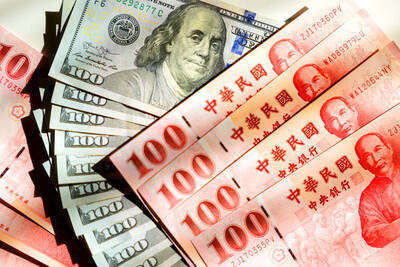Defending the body’s monetary policy, central bank Deputy Governor George Chou (周阿定) said yesterday the exchange rate only had a limited impact on foreign trade and blamed the sharp decline in exports partly on over-concentration of high-tech products and lack of branding.
Chou made the comments after the New Taiwan dollar dropped 0.5 percent to NT$34.797 against the US currency. It is expected that the NT dollar will soon fall below NT$35, a situation that would benefit exporters but hurt importers.
“The currency rate only has a short-term influence on foreign trade,” Chou told reporters in an unscheduled briefing. “In the long run, its performance has more to do with economic fundamentals. It is not practical to count on exchange rates to boost exports.”
The local currency had devalued NT$0.169 against the greenback at end of the trading session, reversing a 0.5 percent gain a day earlier. The NT dollar has dropped 5.6 percent against the US dollar this year.
Chou said the NT dollar was relatively stable, adding that the Japanese yen, South Korean won and euro had dropped 2.09 percent, 1.8 percent and 1.58 percent respectively yesterday.
Citing a report, the deputy governor attributed rising demand for the US dollar in the last month to a new wave of capital repatriation to redeem assets at home.
Asian equity fund outflows resumed and reached US$509 million last week on concerns about the deteriorating global financial situation, Citigroup Global Markets said in a client note on yesterday, citing statistics compiled by EPFR Global, a Cambridge, Massachusetts-based fund research firm.
Month-to-date, the region saw net capital outflows of US$223 million, compared with net inflows of US$404 million last month and US$208 million in December, the Citigroup note said.
Chou said Taiwan had outperformed South Korea in exports to Japan and Germany in 2007 despite a sizable deterioration in the value of the won.
The monetary regulator acknowledged, however, that over-concentration of high-tech products and a lack of branding made Taiwan more vulnerable to dropping demand than South Korea.
The top two products accounted for 44.7 percent of Taiwan’s exports in 2007 while South Korea’s weighed 34.1 percent, Chou said.
Last year, South Korea posted a 13 percent gain in exports while Taiwan edged up 3 percent, Chou said, attributing the gap to South Korea’s ability to diversify its export products.
“It seems the government could make a greater effort in encouraging firms to diversify their products and create their own brands,” Chou said.
The NT dollar opened at NT$34.628 and touched NT$34.80 during trading. Turnover was US$7.22 billion on the Taipei Forex and US$3.84 billion on the smaller Cosmos Foreign Exchange, for total transactions of US$1.106 billion, data from the two companies showed.
A dealer who declined to be named said the NT dollar would hover between NT$34.50 and NT$34.80 for one or two weeks before sinking to the NT$35 threshold, reflecting economic woes.

WEAKER ACTIVITY: The sharpest deterioration was seen in the electronics and optical components sector, with the production index falling 13.2 points to 44.5 Taiwan’s manufacturing sector last month contracted for a second consecutive month, with the purchasing managers’ index (PMI) slipping to 48, reflecting ongoing caution over trade uncertainties, the Chung-Hua Institution for Economic Research (CIER, 中華經濟研究院) said yesterday. The decline reflects growing caution among companies amid uncertainty surrounding US tariffs, semiconductor duties and automotive import levies, and it is also likely linked to fading front-loading activity, CIER president Lien Hsien-ming (連賢明) said. “Some clients have started shifting orders to Southeast Asian countries where tariff regimes are already clear,” Lien told a news conference. Firms across the supply chain are also lowering stock levels to mitigate

Six Taiwanese companies, including contract chipmaker Taiwan Semiconductor Manufacturing Co (TSMC, 台積電), made the 2025 Fortune Global 500 list of the world’s largest firms by revenue. In a report published by New York-based Fortune magazine on Tuesday, Hon Hai Precision Industry Co (鴻海精密), also known as Foxconn Technology Group (富士康科技集團), ranked highest among Taiwanese firms, placing 28th with revenue of US$213.69 billion. Up 60 spots from last year, TSMC rose to No. 126 with US$90.16 billion in revenue, followed by Quanta Computer Inc (廣達) at 348th, Pegatron Corp (和碩) at 461st, CPC Corp, Taiwan (台灣中油) at 494th and Wistron Corp (緯創) at

NEW PRODUCTS: MediaTek plans to roll out new products this quarter, including a flagship mobile phone chip and a GB10 chip that it is codeveloping with Nvidia Corp MediaTek Inc (聯發科) yesterday projected that revenue this quarter would dip by 7 to 13 percent to between NT$130.1 billion and NT$140 billion (US$4.38 billion and US$4.71 billion), compared with NT$150.37 billion last quarter, which it attributed to subdued front-loading demand and unfavorable foreign exchange rates. The Hsinchu-based chip designer said that the forecast factored in the negative effects of an estimated 6 percent appreciation of the New Taiwan dollar against the greenback. “As some demand has been pulled into the first half of the year and resulted in a different quarterly pattern, we expect the third quarter revenue to decline sequentially,”

The New Taiwan dollar yesterday extended its losing streak to a fifth straight session, closing at NT$29.719 against the US dollar, down NT$0.13 from the previous day, as broad US dollar strength and lingering trade uncertainties weighed on non-US dollar currencies, traders said. The NT dollar depreciated NT$0.357, or 1.21 percent, against the greenback over the past five trading days, central bank data showed. Turnover at Taipei Forex Inc fell to US$878 million, reflecting subdued investor activity as markets await Washington’s tariff rate on Taiwan. “The US dollar index has shown significant strength in recent sessions, putting pressure on non-dollar currencies,” a Taipei-based